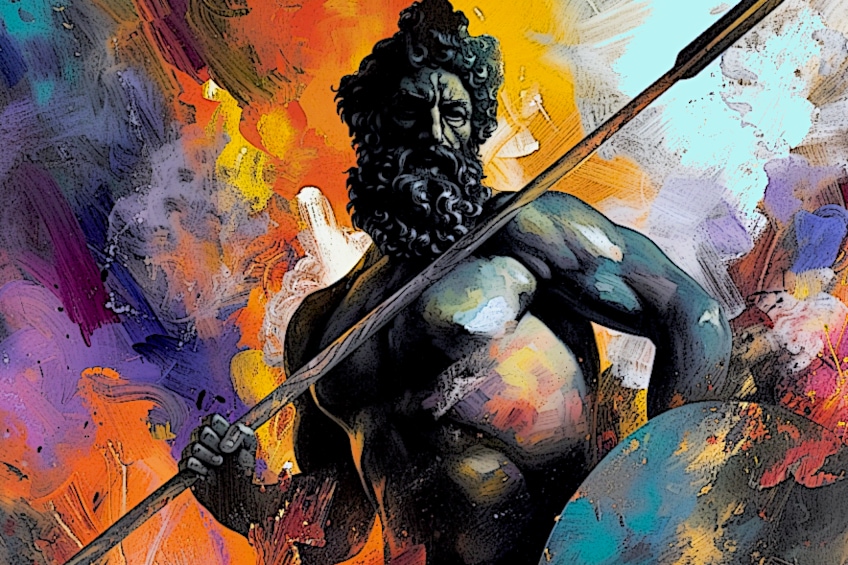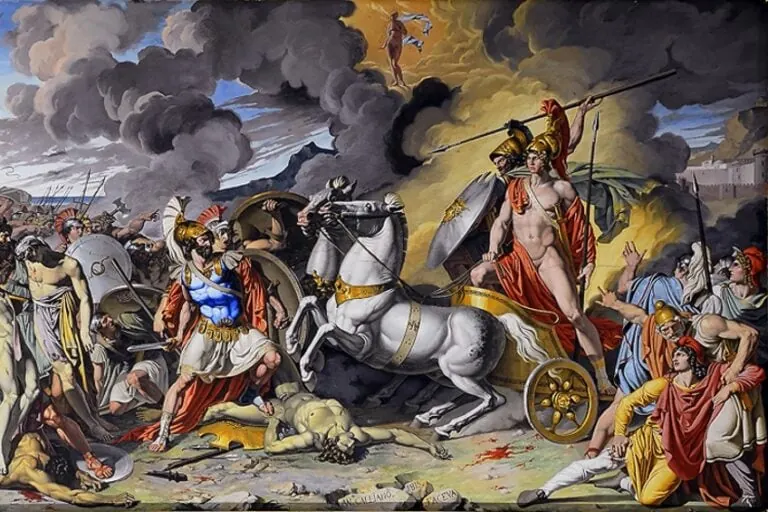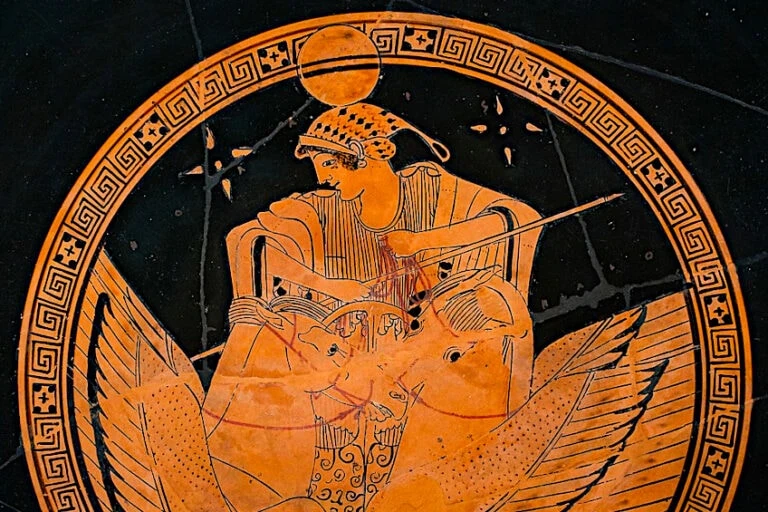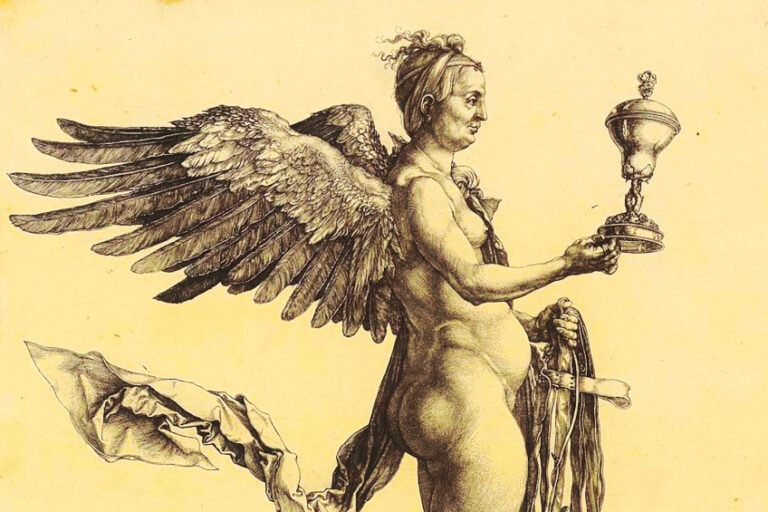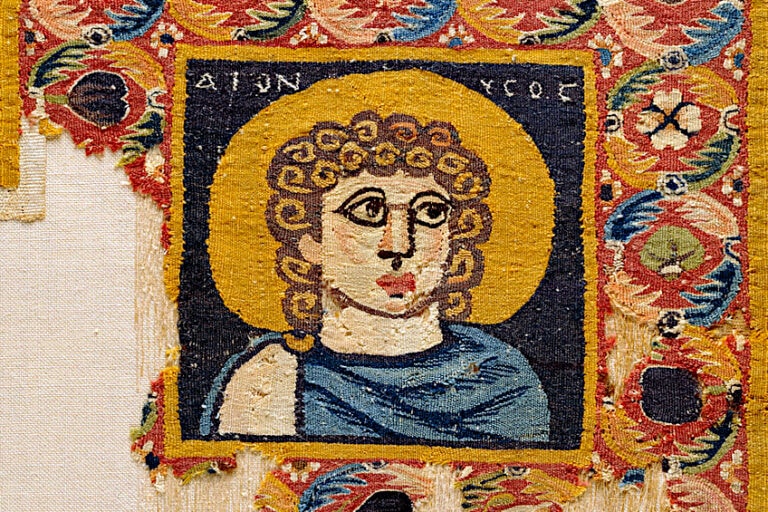Greek God Iapetus – Commander of the Titan Forces
The Greek god Iapetus was believed to once be the western pillar supporting the sky and the ancestor of all humanity. This Titan was a fierce general and adversary of Zeus, and father to the Titan brothers responsible for humanity’s creation and fate, according to the ancient Greek worldview. Check out the article below where we examine just how this Titan god moved through Greek mythology, and the ripples he left in his wake.
Iapetus: The Pillar of the West
| Name | Iapetus |
| Gender | Male |
| God of | The western pillar of the heavens |
| Personality | Fierce, powerful, and loving |
| Consorts | Clymene or Asia |
| Children | Atlas, Epimetheus, Menoetius, and Prometheus |
| Parents | Gaia and Uranus |
Iapetus is a Titan of Greek mythology who was one of the Titans who helped Cronus overthrow their father the sky primordial Uranus and battle the god Zeus during the Titanomachy.
A fierce adversary of Zeus and father to four influential Titan brothers, Iapetus is a key figure in the early parts of the ancient Greek myth-history.
Background and Family of the Titan Iapetus
The Greek god Iapetus is unfortunately shrouded in mystery as mentions of him in surviving texts and art are lacking.
His name is commonly held to be taken from the Greek word ‘iaptô’ which translates to “wound”, or more commonly to “pierce” with connotations of a spear.
His main contributions to mythology include being one of Kronos’ brothers and father to the four Titan brothers Atlas, Epimetheus, Menoetius, and Prometheus.
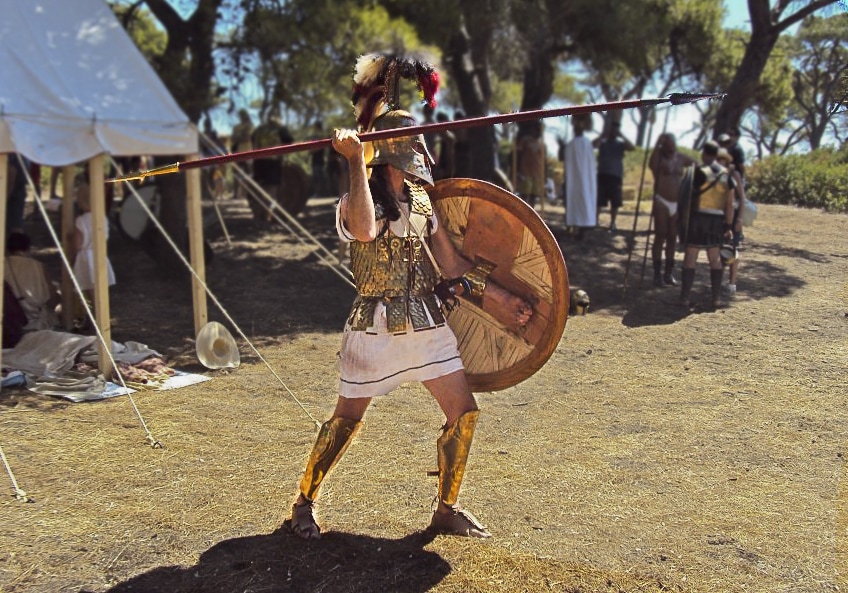 Modern recreation of ancient Greek Hoplite armor and weaponry including a spear; Phokion, CC BY-SA 4.0, via Wikimedia Commons
Modern recreation of ancient Greek Hoplite armor and weaponry including a spear; Phokion, CC BY-SA 4.0, via Wikimedia Commons
Iapetus’ Lineage
Hesiod’s Theogony (8th-7th century BCE) lists Iapetus as one of the twelve Titans born of the union between the primordial Earth goddess Gaia and the primordial sky god Uranus. The other eleven include his brothers Hyperion, Iapetus, Koios, Krios, Cronus, and Oceanus, and his sisters, Mnemosyne, Pheobe, Tethys, Theia, Themis, and Rhea. Siblings groups to the Titanides are the Cyclops, the Erinyes, the Hecatoncheiries, the Meliae, and the Gigantes. The last group of the Gigantes includes Iapetus and his brother Koios though they are already alive by their birth. Singular siblings include figures such as Nereus, Aphrodite, Thaumus, Phorcys, Ceto, Eurybia, and Typhon.
Iapetus took to wife the Oceanid Clymene, one of the innumerable daughters of his brother Oceanus and sister Tethys. By Clymene, he had his only children, his four sons by the names of Atlas, Epimetheus, Menoetius, and Prometheus.
Iapetus’ Role in Ancient Greek Mythology
Iapetus as a Titan in Greek mythology plays the role of explaining the ages prior to the Olympian myth-history believed by the ancient Greeks. Iapetus has perhaps one of the most unique genealogical roles of any other Titan in the Greek mythos.
He is not just one of the defeated Titans who languished in Tartarus but he also plays a role in the origin of humanity.
The Titan General
Iapetus was one of the Titans the primordial earth other Gaia urged against their father the primordial sky god Uranus. They were hesitant but for the youngest Kronos, who took up a scythe and castrated his father. Common myth traditions hold that the Titan brothers, sometimes excluding Oceanus, assisted him by holding down their father. Kronos overthrew his father and ruled the cosmos with his brothers by his side. They were also by his side when Zeus sought to overthrow Kronos during the ten-year war of the gods known as the Titanomachy.
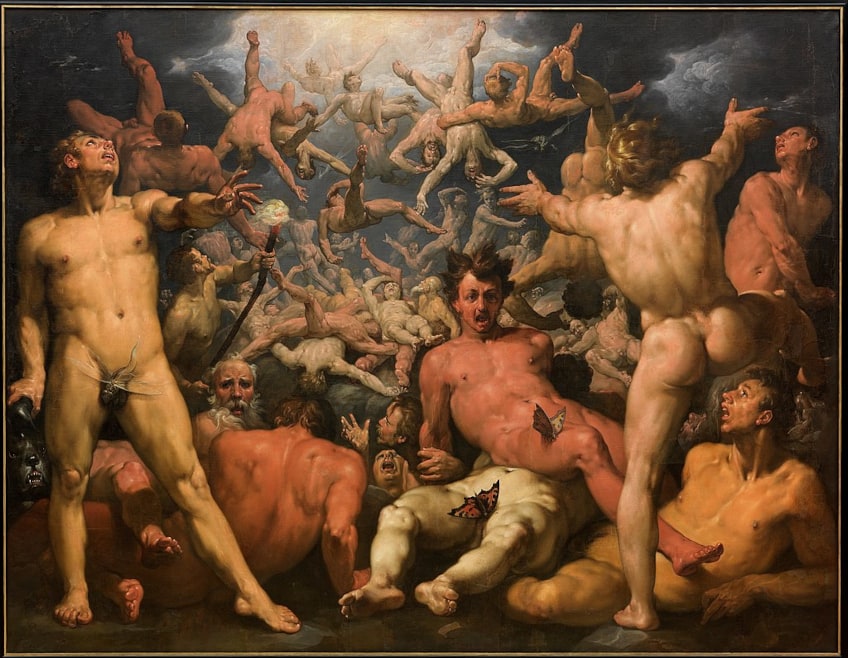 The Fall of the Titans by Cornelis van Haarlem (1588-1590); Cornelis van Haarlem, Public domain, via Wikimedia Commons
The Fall of the Titans by Cornelis van Haarlem (1588-1590); Cornelis van Haarlem, Public domain, via Wikimedia Commons
Iapetus was noted as a “fierce general” of the Titans in the Argonautica (1st century CE), and a dread adversary of Zeus who was noted as chained in Tartarus’ deep depths. He is listed as one of the Gigantes, either hinting at a role he may have played in the War of the Giants, or it may be a case of a similar name or a confusion with the Titanomachy.
It is clear that our Titan Iapetus was a key figure in multiple wars for control over the cosmos throughout Greek mythology.
His fate is unknown though it is said that in the lost work of Prometheus Bound Zeus freed his uncle Iapetus and the other Titans and granted them clemency.
Western Heavenly Pillar
After the overthrowing of Uranus and the establishment of Kronos as king, the Titans ruled the Golden Age of Greek mythology. According to one mythic tradition, Iapetus and his brothers fulfilled the cosmological role of the four-heavenly pillars that upheld the sky from the earth that was found in the myths of the Near-East.
The brothers who assisted Cronus were given honors and upheld the sky from the earth, one at each corner of the world.
Koios was the northern pillar, Krios that of the south, Hyperion that of the east, and Iapetus claimed the West. His son Atlas would follow in his footsteps after Iapetus was thrown into the abyss of Tartarus.
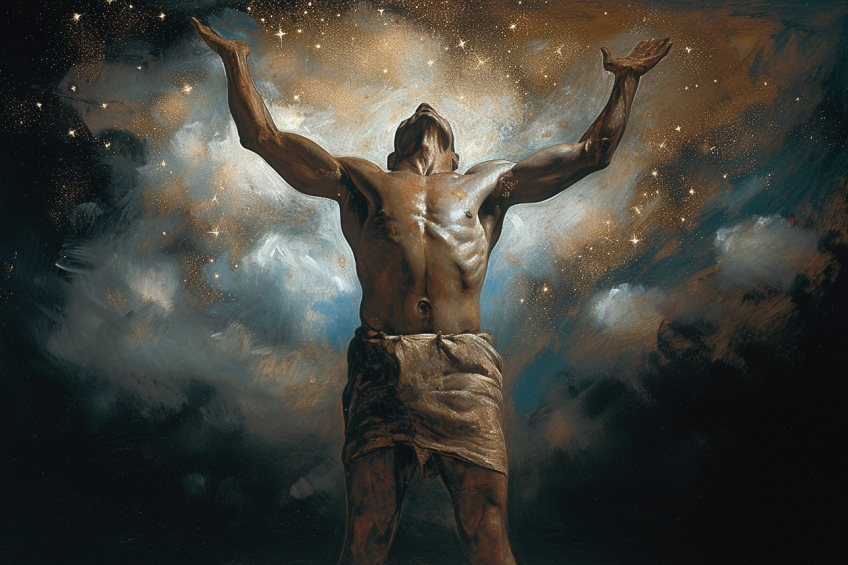 Iapetus holding up the sky; artist’s impression
Iapetus holding up the sky; artist’s impression
Atlas was punished for his role in fighting against Zeus by being forced to stand at the western edge of the world and bear the entire heavens by himself. Iapetus and his brothers being thrown into the abyss of Tartarus is suggested as being their transition from upholding the heavens to bearing the entire cosmos.
Ancestor of Humanity
While the Titans were considered beings of the past or a time before the more relevant Olympian era, they were not without their contributions in mythology. Titans often held domain over cosmogony and directly over humanity and their progress on earth.
Iapetus’ sons were especially connected with humanity and embodied human qualities, such as being daring, foolish, arrogant, or crafty, to their negative extremes.
In some myths, Epimetheus and Prometheus held direct roles in the creation and propagation of mankind as the Greeks knew it and were considered representatives of humanity. One myth describes how Epimetheus and Prometheus were tasked with populating the world with mortal beasts and humans, and in one variant Epimetheus would give them each their traits from a vast selection provided by Zeus. Through lack of forethought, he left none for humans, and so Prometheus stole the civilizing arts and fire from the gods to give to mankind so they would survive the world. Afterward, Epimetheus wed Pandora, a woman created by the gods specifically to deceive the foolish Epimetheus. Her dowry included a vase that she and her husband were advised not to open. When they did so, they unleashed the ills that plague humanity.
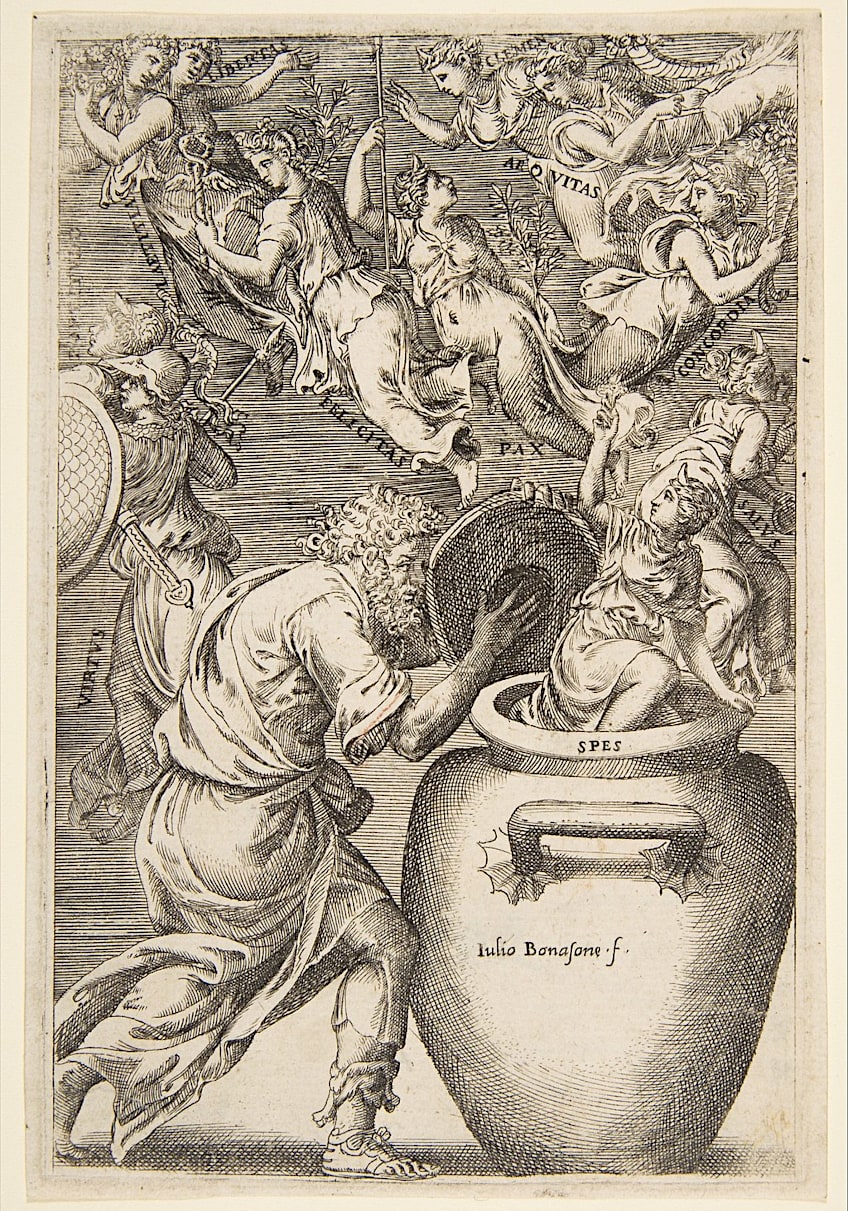 Epimetheus Opening Pandora’s Box by Giulio Bonasone (between 1531-76); Giulio Bonasone, CC0, via Wikimedia Commons
Epimetheus Opening Pandora’s Box by Giulio Bonasone (between 1531-76); Giulio Bonasone, CC0, via Wikimedia Commons
Pandora bore her husband the first mortal woman Pyrrha. Iapetus’ granddaughter Pyrrha married his grandson through Prometheus named Deukalion, who were the only two mortals to survive the deluge Zeus brought to end the Greek Bronze Age. Together Pyrrha and Deukalion repopulated the earth with men and women, and thus the human race is considered to be the descendants of Iapetus and he, our ancestor.
God of Mortality
The Titan Iapetus has no named domain and thus there is some debate concerning what is Iapetus the god of, however, modern interpretations often attribute the sphere of mortality to him.
Iapetus’ name having connections to “wound” or “piercer”, as well as his sons’ ties with the fate of humanity and other mortal creatures, has culminated in a modern attribution of him as being the god of mortality and life spans.
Traditionally the Fates would begin, measure, and end the life thread of mortal fates, which limits him somewhat to the realm of mortality as the origin of the origin of mortal life in the world.
Attributes of the Greek God Iapetus
As a rule, Titans were considered ancient and wild powers of the world, and on the whole more aggressive than their Olympian counterparts. Iapetus is not described physically though he is noted as a fierce general of the Titans, which displays just how powerful and ferocious he was considered to be. His name translated to “the piercer” adds to the impression of his martial and vicious edge.
His actions may be violent, however, the Argonautica notes that he was amongst those who pleaded for Zeus’ mercy on behalf of the Titan Prometheus.
Iapetus cried from his prison in Tartarus, begging his adversary Zeus to free his son Prometheus from his torturous punishment, showing him as a Titan who knew more than a lust for conflict and conquest. Iapetus, grandfather of humanity, was also a father who cared for his son without regard for his own torture in Tartarus.
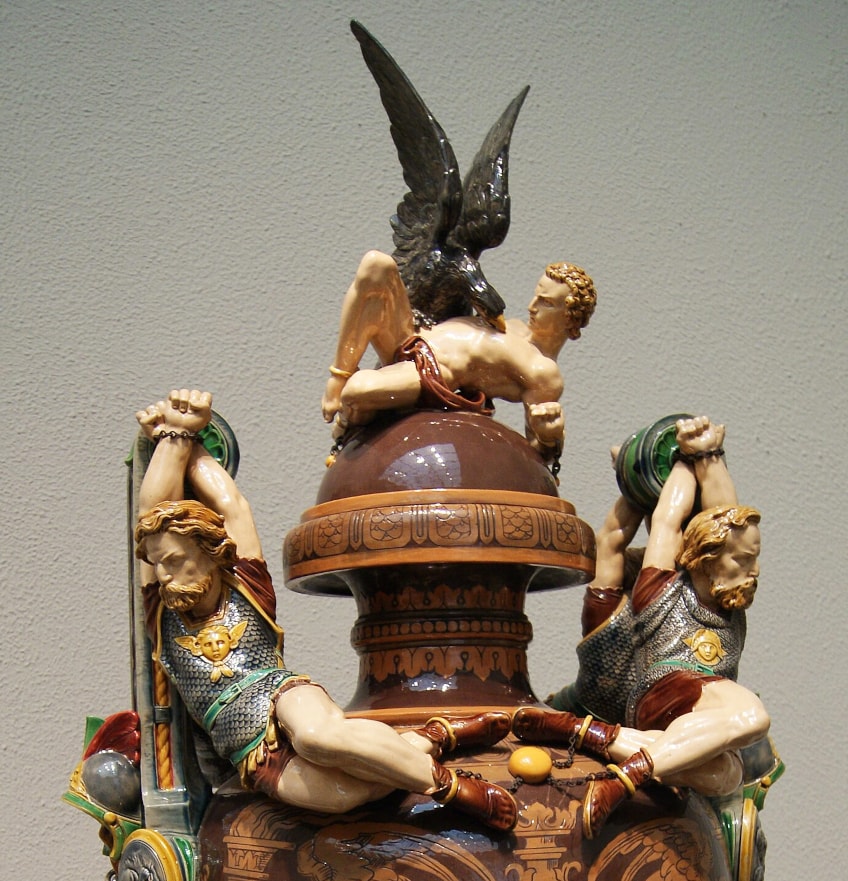 Prometheus Vase by Victor Etienne Simyan and Silas Rice (1867); Philadelphia Museum of Art, Public domain, via Wikimedia Commons
Prometheus Vase by Victor Etienne Simyan and Silas Rice (1867); Philadelphia Museum of Art, Public domain, via Wikimedia Commons
Descriptions of Iapetus outside of lists and his relations are scarce, and as one of the overthrow Titans no works surviving detail anything of his domain or influence in cult life. It is possible he had none at all, being part of the bygone eras of Greek myth history and without a known link to their daily lived experience. We know nothing of Iapetus’ symbols and influences in myth, cult, or works of art or literature.
As it stands, he has no known areas of worship, dedicated festivals or rituals, or sacred places. Without more surviving myths, he is not associated with any specific animals or items that could be considered as Iapetus’ symbols.
Iapetus’ Modern Legacy
The uniqueness of the Greek god Iapetus is not solely in his genealogical role in myth. He has been associated with another progenitor of humanity in Japeth, one of the sons of Noah of the Judeo-Christian tradition.
Japeth was one of those who repopulated the earth after the great flood and has come to be associated with Iapetus by early mythographers seeking similarities.
Iapetus is also the third largest moon orbiting the planet Saturn and is known for its unique features. The moon has a striking contrast between its bright trailing hemisphere and its dark leading one, as well as a gigantic mountain feature running three-quarters of the distance around its surface known as its equatorial ridge. How these features formed has been as much of a mystery to scientists studying the moon as the Titan Iapetus has been to readers of Greek mythology. Saturn itself is named for the Roman equivalent of Iapetus’ brother Cronus.
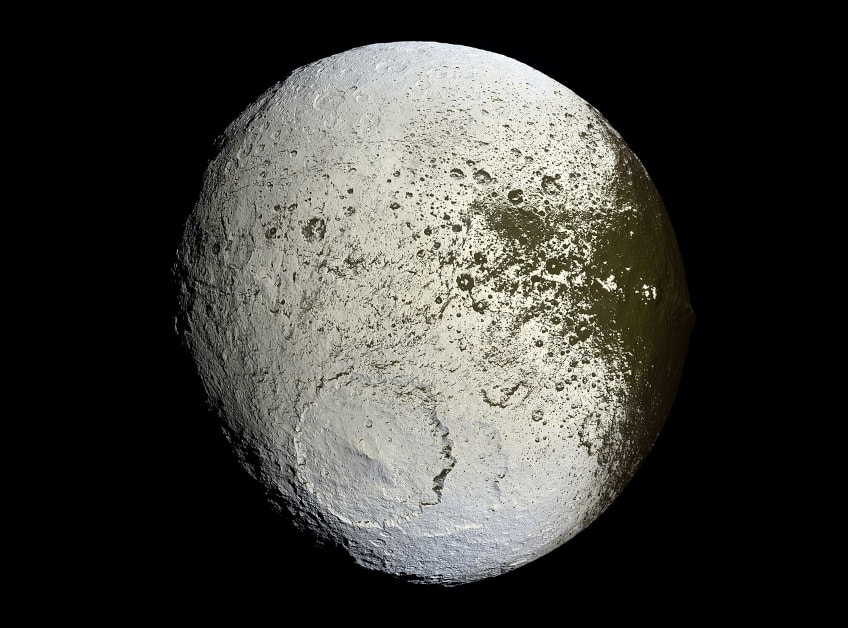 Iapetus as seen by the Cassini probe (2007); NASA / JPL / Space Science Institute, Public domain, via Wikimedia Commons
Iapetus as seen by the Cassini probe (2007); NASA / JPL / Space Science Institute, Public domain, via Wikimedia Commons
Lessons Learned of the Titan Iapetus
Iapetus and his sons as the creators and ancestors of humanity paint the origin of what we see as our worst traits. Our fierceness, lack of forethought, hubris, overconfidence in our cunning, and our daring, are natural parts of us but ones that we should not indulge too much or else we face dire consequences. We have inherited traits that in excess could spawn to an ugly evil in our lives without proper restraint and prudence.
The Titanomachy was lost to the arrogance of relying on their direct martial ability alone just as the fate of Iapetus’ sons and countess mortals since were lost to the sins of indulging our worst traits.
Iapetus’ story is one of loss, as he fell from the heights of power to the lowest pits of the abyss, and reminds us that we need to live humbly and be aware of our faults just as much as we are aware of our strengths.
The Titan Iapetus wields a unique place in mythology in that he is the origin of humanity’s creators and representatives. A fearsome figure of cosmic wars and an ancestor of all mortals, he is an influential god in the fabric of Greek mythology. Despite what little is known of him and his general lack of worship, Iapetus manages to make his presence felt in the background of the creation narratives of ancient Greece, and in our own curious investigations centuries later.
Frequently Asked Questions
What Is Iapetus the God Of?
Modern commentaries claim Iapetus as the Titan god of mortality, though Iapetus is not noted to have a domain in classical literature. As his name is the piercer and his children and grandchildren are directly involved with the creation, fate, and repopulation of humanity in particular and mortal creatures as a whole, mortality has been tentatively added as his speculated sphere. He is also considered one of the four heavenly pillars that once upheld the heavens from the earth in mythology.
What Was the Significance of Iapetus?
Outside of once ruling the cosmos and holding up the sky, Iapetus was the father and grandfather of those figures of myth credited for shaping and propagating humanity in the Greek creation narrative. He is thus an influential point of the first godly wars, and of the way humans were formed and evolved through the ages. In particular, his descendants not only defined humanity as a species and embodied our worst impulses, but are in themselves the human race. Through his grandchildren, Iapetus is considered the ancestor of humanity in Greek mythology.

I am deeply passionate about history and am constantly fascinated by the rich and complex stories of the past. As the editor-in-chief of learning-history.com, I have the opportunity to share this passion with a wide audience through the creation and distribution of engaging and informative content about historical events, persons, and cultures. Whether it’s through writing articles and blog posts or creating videos or podcasts, I strive to bring the past to life in a way that is both accurate and enjoyable. My expertise in history, combined with my strong writing and communication skills, allows me to effectively communicate complex historical concepts and make them accessible and interesting to a wide range of readers. I am truly grateful for the opportunity to share my love of history with others through my work on learning-history.com.

